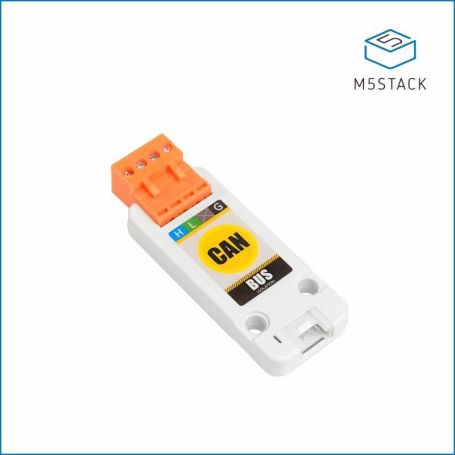M5Stack : CAN bus Module, Grove
CAN bus Module, Grove
- CA-IS3050G
- Interface: I2C
- 1Mbps max
- Isolation 5000V
- Interface : Can_Rx, Can_Tx
- 5 Volt Power
- Module U085
Payments are secured by LyraCollect, a French payment collection company.
It is possible to delivered to your home, to a pick-up point or picked up by appointment at MCHobby
We prepare, pack and ship your orders with great respect and care.
CAN (Control Area Network) module with Grove connexion
CAN bus Grove module is an isolated transceiver for Controller Area Network (CAN) which can be used to build a complex CAN communication network as used car control network, industrial field control or security system.
The module have a built-in DC-DC isolated power chip to avoids noise / interference injection into the main's power supply (which may damage sensitive circuits in the project).
The isolated CAN transceiver is based on the CA-IS3050G chip supporting differential reception / transmission. The CAN bus can have up to 110 nodes with a theoritical transmission rate reaching 1Mbps. The module also have current limiting, over-voltage, grounding loss protection (–40 V to 40 V) plus a thermal shutdown function. Such protections can prevent output short-circuit issue and meets the ISO11898-2 specifications.
About CAN bus
CAN is an International ISO standard for serial communication protocol. CAN is also a 2 wire bus topology where several devices share the same bus. Any device can try to get the control over the bus at any time (there is no bus master but a notion of "priority"). CAN is a kind of serial communication network which can effectively support distributed control or real-time control.
The distributed control system based on CAN bus adopts multi master competitive bus structure, which has the characteristics of multi master station operation, decentralized arbitration and broadcast communication.
CAN have several advantages:
- High speed data communication between nodes.
- When multiple nodes initiate communication at the same time: the one with the higher priority will be the winner (the lower low priority device will just stop transmitting).
- Few/none congestion on communication line (thank to priority election).
- Communication distance can reach 10km (rate at 5Kbps).
- The rate can reach 1Mbps for shorter distance (<40m).
Technical details
- Base on CA-IS3050G (ChipAnalog)
- Up to 1000 Vrms isolation and withstand voltage
- Built-in isolated DC-DC
- Common mode voltage: -12V to +12V
- Low loop delay: -150ns
- Number of nodes: 110 (theorical)
- Signal rate up to 1Mbps
- Protection function: signal isolation, current limiting, over-voltage protection and thermal shutdown
- 2x LEGO compatible hole
- Grove connector (HY2.0 4P)
- Weight: 12gr
Tutorial
- M5Doc on CAN controler (M5Stack, English, U085)
Schematic, Arduino Code, Pinout










